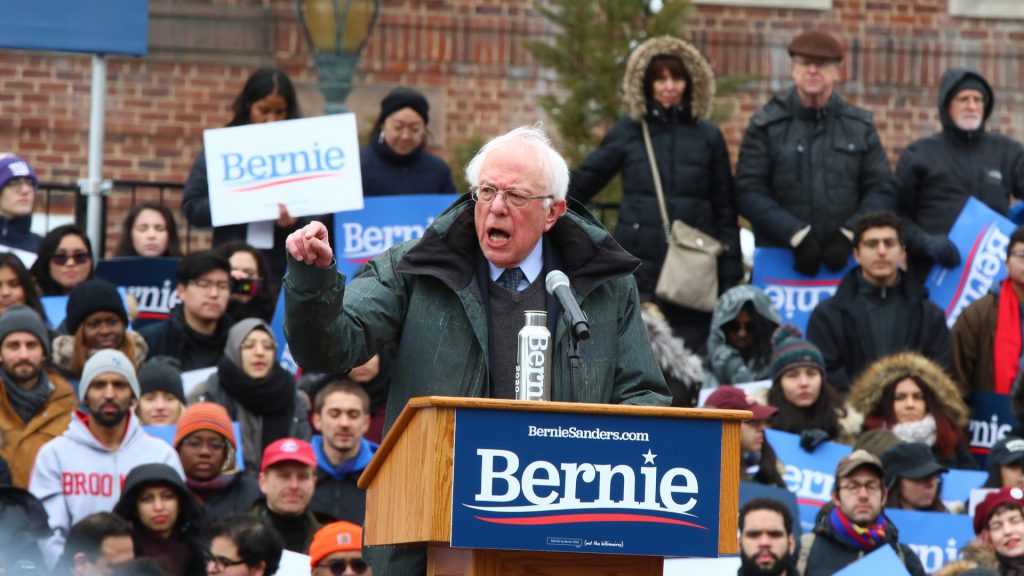
Published March 18, 2019
Judging by the mix of Democratic candidates vying to take on President Trump in 2020, there’s clearly an appetite among some on the left to put forward a more progressive campaign to take the White House. But doing so would help one person in particular: Trump. Look to recent polls from Emerson College to see why.
The Emerson College polls in early-primary states all show that Trump’s share of the vote in test ballots against potential Democratic opponents is higher than his job approval ratings and increases as his Democrat opponent becomes more progressive. In each state, Trump polls worst against former vice president Joe Biden, slightly better against Sen. Bernie Sanders (I-Vt.) and best against Sen. Kamala D. Harris (D-Calif.).
In each state, Trump’s job approval ratings are not at all predictive of how he fares in ballot tests. In South Carolina, Trump’s job approval rating is 50 percent. He gets 52 percent against Biden, 54 percent against Sanders and 56 percent against Harris. That’s a six-point gap between his job approval and his best ballot test showing.
In Michigan and Wisconsin, Trump’s job approval ratings are much lower, but his gap is even higher. His job approval in both states is low — 41 percent in Wisconsin and only 40 percent in Michigan. But Trump receives 46 percent of the vote against Biden in both states and gets 48 percent and 47 percent against Sanders in Wisconsin and in Michigan, respectively. Against Harris, Trump gets 50 percent in Wisconsin and 49 percent in Michigan. That’s a nine-point increase in both cases over his seemingly paltry job approval ratings.
Interestingly, Trump’s share of the vote goes up among Democrats, Republicans and independents alike the more progressive the Democrat. The share of Democrats who would vote for Trump in Wisconsin, for example, increases from 8.4 percent to 10.9 percent between Biden and Harris, and the share of Badger State independents for Trump goes up from 44.3 percent to 48.8 percent. But the biggest movement is among Republicans. In Wisconsin, Trump’s share of the GOP vote rises from 87.7 percent against Biden to 94.5 percent against Harris. In Michigan, the GOP vote for Trump increases from 89.2 percent against Biden to 92.3 percent against Harris.
Some of this could be ascribed to differences in name identification. Harris, for example, remains less well known than Biden because he has been in the public eye so much longer. But Sanders is nearly as well known as Biden in most polls, and he too does less well in these ballot tests than does Biden. The obvious answer seems to be that more progressive Democrats do less well against Trump than does the more centrist Biden.
It’s striking that this is true before Trump has started to contrast himself with any specific nominee. The Democratic primary campaign has already forced many candidates to the left on issues such as Medicare-for-all and the Green New Deal. Unless one of the leading candidates chooses to pointedly differ with the party’s emerging consensus, the next year will surely heighten the identification of the Democratic Party with its progressive wing.
This identification will be aided and abetted by Trump and the Republicans once someone emerges. They will surely pound that person relentlessly over whatever progressive positions the nominee has taken, creating more cross-pressures on the moderate voter who doesn’t like Trump. Trump won in 2016 because he carried voters who liked neither him nor Hillary Clinton by 47 percent to 30-percent. Driving up the Democrat’s negative ratings based on his or her policy positions looks to be his best chance at reelection — and the Emerson poll data suggests it could work.
Democratic analysts look at Trump’s low job approval ratings in swing Midwestern states and are confident they can retake them. These data show how misplaced that sanguine calm is.
Henry Olsen is a Washington Post columnist and a senior fellow at the Ethics and Public Policy Center.








